Katey Schultz's Blog, page 2
March 4, 2016
How to Support Indie Booksellers
A few weeks ago, I attended Writer's Coffeehouse hosted by author Jake Bible at Malaprop's Bookstore/Cafe in Asheville. If you're local, don't miss the next one. This event is where writers of all kinds come together to discuss the business aspects of writing, publishing, and selling books. I want to share some of what I learned with you in today's post. Some of you may remember that Malaprop's is the store that launched Flashes of War in May 2013 to the beautiful, smiling faces of this crowd:
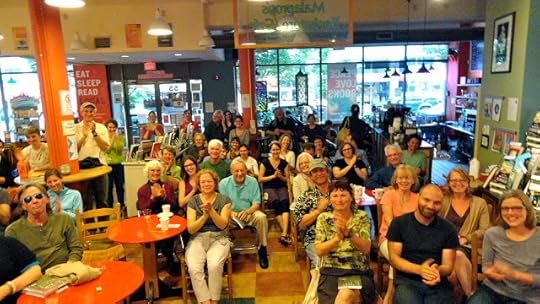
A year later, it was the energy and support of that night at Malaprop's that kept me going, finishing up a 52-event book tour that taught me more than I ever thought I'd know about selling books and reaching book buyers.
But there's always more to learn. Case in point, the most recent Writer's Coffeehouse featured Malaprop's staff members who presented tips. These small actions have a big impact. If you're reading this now, I encourage you to follow through, then let your local indy bookseller know what you've done and see if you can get writerson board. As Lauren at Malaprop's says, "Nobody in this business is getting rich," which means that everybody in this business loves books for the sheer pleasure and goodness they can bring. Here's how to show it:
Set your email signature to link to your favorite bookseller. Here's what mine looks like:Flashes of War from my fave indy bookseller, Malaprop's!
Events, blog, & course info: opt-in via email here.
Visit website: www.kateyschultz.com
Follow @kateyschultz
Link to your indy bookseller on the "book" or "buy now" pages of your website (check out the upper left corner of this site, and also right here, for examples.) I also like how author David Abrams tackles this--hitting indys and biggies. Here's a partial screenshot: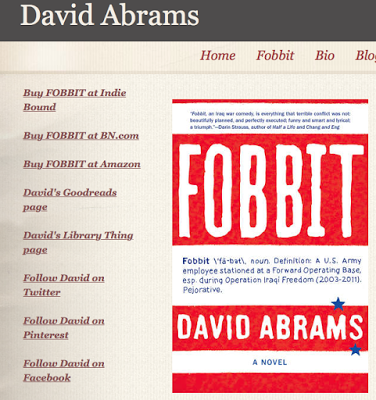 Follow your indy bookseller on social media and share their upcoming author events. (Here's Malaprop's on Twitter and Facebook) And guess what? You now have the power to help make someone's day by showing up to their book launch. Check out Catherynne Valente this Saturday, if you're in the area.Don't want to limit yourself to just one indy bookseller, or have a hard time choosing a favorite? Make all your links to go IndieBound instead. This is a community of indy booksellers that makes a movement out of book buying, and has all kinds of useful facts to entice others to join that movement, such as: Spend $100 at a local and $52 of that stays in your community. Spend the same $100 at a national chain, and your community only sees $43.That's all for now, because small change is real change and real change is possible RIGHT NOW. Change a few links, tag a few folks, and pat yourselves on the back. Then stay tuned for more tips in the coming months...
Follow your indy bookseller on social media and share their upcoming author events. (Here's Malaprop's on Twitter and Facebook) And guess what? You now have the power to help make someone's day by showing up to their book launch. Check out Catherynne Valente this Saturday, if you're in the area.Don't want to limit yourself to just one indy bookseller, or have a hard time choosing a favorite? Make all your links to go IndieBound instead. This is a community of indy booksellers that makes a movement out of book buying, and has all kinds of useful facts to entice others to join that movement, such as: Spend $100 at a local and $52 of that stays in your community. Spend the same $100 at a national chain, and your community only sees $43.That's all for now, because small change is real change and real change is possible RIGHT NOW. Change a few links, tag a few folks, and pat yourselves on the back. Then stay tuned for more tips in the coming months...








A year later, it was the energy and support of that night at Malaprop's that kept me going, finishing up a 52-event book tour that taught me more than I ever thought I'd know about selling books and reaching book buyers.
But there's always more to learn. Case in point, the most recent Writer's Coffeehouse featured Malaprop's staff members who presented tips. These small actions have a big impact. If you're reading this now, I encourage you to follow through, then let your local indy bookseller know what you've done and see if you can get writerson board. As Lauren at Malaprop's says, "Nobody in this business is getting rich," which means that everybody in this business loves books for the sheer pleasure and goodness they can bring. Here's how to show it:
Set your email signature to link to your favorite bookseller. Here's what mine looks like:Flashes of War from my fave indy bookseller, Malaprop's!
Events, blog, & course info: opt-in via email here.
Visit website: www.kateyschultz.com
Follow @kateyschultz
Link to your indy bookseller on the "book" or "buy now" pages of your website (check out the upper left corner of this site, and also right here, for examples.) I also like how author David Abrams tackles this--hitting indys and biggies. Here's a partial screenshot:
 Follow your indy bookseller on social media and share their upcoming author events. (Here's Malaprop's on Twitter and Facebook) And guess what? You now have the power to help make someone's day by showing up to their book launch. Check out Catherynne Valente this Saturday, if you're in the area.Don't want to limit yourself to just one indy bookseller, or have a hard time choosing a favorite? Make all your links to go IndieBound instead. This is a community of indy booksellers that makes a movement out of book buying, and has all kinds of useful facts to entice others to join that movement, such as: Spend $100 at a local and $52 of that stays in your community. Spend the same $100 at a national chain, and your community only sees $43.That's all for now, because small change is real change and real change is possible RIGHT NOW. Change a few links, tag a few folks, and pat yourselves on the back. Then stay tuned for more tips in the coming months...
Follow your indy bookseller on social media and share their upcoming author events. (Here's Malaprop's on Twitter and Facebook) And guess what? You now have the power to help make someone's day by showing up to their book launch. Check out Catherynne Valente this Saturday, if you're in the area.Don't want to limit yourself to just one indy bookseller, or have a hard time choosing a favorite? Make all your links to go IndieBound instead. This is a community of indy booksellers that makes a movement out of book buying, and has all kinds of useful facts to entice others to join that movement, such as: Spend $100 at a local and $52 of that stays in your community. Spend the same $100 at a national chain, and your community only sees $43.That's all for now, because small change is real change and real change is possible RIGHT NOW. Change a few links, tag a few folks, and pat yourselves on the back. Then stay tuned for more tips in the coming months...







Published on March 04, 2016 05:30
How to Support Indy Booksellers
A few weeks ago, I attended Writer's Coffeehouse hosted by author Jake Bible at Malaprop's Bookstore/Cafe in Asheville. If you're local, don't miss the next one. This event is where writers of all kinds come together to discuss the business aspects of writing, publishing, and selling books. I want to share some of what I learned with you in today's post. Some of you may remember that Malaprop's is the store that launched Flashes of War in May 2013 to the beautiful, smiling faces of this crowd:

A year later, it was the energy and support of that night at Malaprop's that kept me going, finishing up a 52-event book tour that taught me more than I ever thought I'd know about selling books and reaching book buyers.
But there's always more to learn. Case in point, the most recent Writer's Coffeehouse featured Malaprop's staff members who presented tips. These small actions have a big impact. If you're reading this now, I encourage you to follow through, then let your local indy bookseller know what you've done and see if you can get writerson board. As Lauren at Malaprop's says, "Nobody in this business is getting rich," which means that everybody in this business loves books for the sheer pleasure and goodness they can bring. Here's how to show it:
Set your email signature to link to your favorite bookseller. Here's what mine looks like:Flashes of War from my fave indy bookseller, Malaprop's!
Events, blog, & course info: opt-in via email here.
Visit website: www.kateyschultz.com
Follow @kateyschultz
Link to your indy bookseller on the "book" or "buy now" pages of your website (check out the upper left corner of this site, and also right here, for examples.) I also like how author David Abrams tackles this--hitting indys and biggies. Here's a partial screenshot: Follow your indy bookseller on social media and share their upcoming author events. (Here's Malaprop's on Twitter and Facebook) And guess what? You now have the power to help make someone's day by showing up to their book launch. Check out Catherynne Valente this Saturday, if you're in the area.Don't want to limit yourself to just one indy bookseller, or have a hard time choosing a favorite? Make all your links to go IndieBound instead. This is a community of indy booksellers that makes a movement out of book buying, and has all kinds of useful facts to entice others to join that movement, such as: Spend $100 at a local and $52 of that stays in your community. Spend the same $100 at a national chain, and your community only sees $43.That's all for now, because small change is real change and real change is possible RIGHT NOW. Change a few links, tag a few folks, and pat yourselves on the back. Then stay tuned for more tips in the coming months...
Follow your indy bookseller on social media and share their upcoming author events. (Here's Malaprop's on Twitter and Facebook) And guess what? You now have the power to help make someone's day by showing up to their book launch. Check out Catherynne Valente this Saturday, if you're in the area.Don't want to limit yourself to just one indy bookseller, or have a hard time choosing a favorite? Make all your links to go IndieBound instead. This is a community of indy booksellers that makes a movement out of book buying, and has all kinds of useful facts to entice others to join that movement, such as: Spend $100 at a local and $52 of that stays in your community. Spend the same $100 at a national chain, and your community only sees $43.That's all for now, because small change is real change and real change is possible RIGHT NOW. Change a few links, tag a few folks, and pat yourselves on the back. Then stay tuned for more tips in the coming months...








A year later, it was the energy and support of that night at Malaprop's that kept me going, finishing up a 52-event book tour that taught me more than I ever thought I'd know about selling books and reaching book buyers.
But there's always more to learn. Case in point, the most recent Writer's Coffeehouse featured Malaprop's staff members who presented tips. These small actions have a big impact. If you're reading this now, I encourage you to follow through, then let your local indy bookseller know what you've done and see if you can get writerson board. As Lauren at Malaprop's says, "Nobody in this business is getting rich," which means that everybody in this business loves books for the sheer pleasure and goodness they can bring. Here's how to show it:
Set your email signature to link to your favorite bookseller. Here's what mine looks like:Flashes of War from my fave indy bookseller, Malaprop's!
Events, blog, & course info: opt-in via email here.
Visit website: www.kateyschultz.com
Follow @kateyschultz
Link to your indy bookseller on the "book" or "buy now" pages of your website (check out the upper left corner of this site, and also right here, for examples.) I also like how author David Abrams tackles this--hitting indys and biggies. Here's a partial screenshot:
 Follow your indy bookseller on social media and share their upcoming author events. (Here's Malaprop's on Twitter and Facebook) And guess what? You now have the power to help make someone's day by showing up to their book launch. Check out Catherynne Valente this Saturday, if you're in the area.Don't want to limit yourself to just one indy bookseller, or have a hard time choosing a favorite? Make all your links to go IndieBound instead. This is a community of indy booksellers that makes a movement out of book buying, and has all kinds of useful facts to entice others to join that movement, such as: Spend $100 at a local and $52 of that stays in your community. Spend the same $100 at a national chain, and your community only sees $43.That's all for now, because small change is real change and real change is possible RIGHT NOW. Change a few links, tag a few folks, and pat yourselves on the back. Then stay tuned for more tips in the coming months...
Follow your indy bookseller on social media and share their upcoming author events. (Here's Malaprop's on Twitter and Facebook) And guess what? You now have the power to help make someone's day by showing up to their book launch. Check out Catherynne Valente this Saturday, if you're in the area.Don't want to limit yourself to just one indy bookseller, or have a hard time choosing a favorite? Make all your links to go IndieBound instead. This is a community of indy booksellers that makes a movement out of book buying, and has all kinds of useful facts to entice others to join that movement, such as: Spend $100 at a local and $52 of that stays in your community. Spend the same $100 at a national chain, and your community only sees $43.That's all for now, because small change is real change and real change is possible RIGHT NOW. Change a few links, tag a few folks, and pat yourselves on the back. Then stay tuned for more tips in the coming months...







Published on March 04, 2016 05:30
March 1, 2016
Creative Flow: Meditation & Revision
 {source}Coming off a weekend of teaching at Interlochen Center for the Arts, where 8 participants and I dove into Deep Revision concepts for prose writers, I'm struck once again by how many writers also identify as meditators.
{source}Coming off a weekend of teaching at Interlochen Center for the Arts, where 8 participants and I dove into Deep Revision concepts for prose writers, I'm struck once again by how many writers also identify as meditators.One thing I like to emphasize when I teach revision is that writing is a physical act. If we want our stories and memoirs to speak to the universal, at some point we've got to be able to look outside the bounds of our own experience and research, even beyond the current bounds of our imaginations, and start thinking outside the box.
One way to make that happen is to get up out of the chair. Go on a walk, a run, a bike ride. Pace the room. Talk to ourselves--Yes, of course writers talk to themselves! We must!--sing to ourselves; you name it. Physically, we can move our bodies and change up the space and views we're familiar with for our early drafts, working with new movement and spaces to jumpstart revision. But metaphorically speaking, we can also work with the internal landscapes of our own minds.
Here's where meditation comes in, along with one of my favorite topics, creative flow. Working with the mind is helpful to writers because, before words, the landscape of our mind is actually the medium we compose in. Something starts--a jolt through the body, an image in the mind's eye, a sense memory triggered--and that initial impulse gradually takes hold, inviting us to start translating whatever we're feeling into narrative on the page. Sometimes it comes out quite literally--perhaps as freewriting or journaling or even talking into a dicatphone. Other times, it comes out in imaginative fiction that seems eons apart from anything we've personally experienced (war, for example). But in either case, it begins in the mind; or the heart-mind, perhaps, which again brings me back to meditation.
If we learn to meditate, these skills are immediately transferable into our lives as imaginative, creative thinkers. Working with our minds, the sky's the limit. And while I'm rarely thinking about "what I'm going to do about that problem in chapter 8" during my medititation sessions, I don't think it's a stretch to say that the skills I've developed in focusing on the breath (touching in with my body and mind through the space of my cells, my lungs, my movement, the room, society, the continent, the globe...) are the same skills that come in handy when I'm trying to revise.
Revision is about looking close; looking closer. It's about that space in between the in breath and the out breath--a space often overlooked; in fact, one might even say it's about the space between the sentences we've drafted so far. If we look closely, mindfully, what do we fine there? What stories within our stories are waiting to come out? How does what rises up speak more keenly to the human experience than, say, our earlier drafts?
This kind of discover can be a delightful process. As The Writing Life blog continues to evolve (11 years, and counting!), it's also something I'll be blogging a lot more about in the months to come. Stay tuned!








Published on March 01, 2016 05:30
February 26, 2016
Think Big: The Evolution of Ideas
Continuing conversations with my creative consultant for my website overhaul, I've been asked to explore the evolution of the values and ideas that inform how I teach and write today.
Stories are valuable. This idea was instilled in me at an early age. Raised by two English majors, I grew up in a house of books. I was freely encouraged to explore all kinds of passions: puffy paint t-shirt designs, homemade bubble gum recipes, performing skits, building tree-forts, and picking blackberries were just a few of my early obsessions as a girl growing up in Portland, Oregon. Maturing during the peak of the Grunge music movement, my skeptical, brooding, teenage self emerged. By the time I reached Ms. Wood’s English class as a junior at Wilson High School, I believed there were too many things that “didn’t add up” about society. I felt angry, confused, adamant. What was our purpose in life and did it always have to come at a cost to others or the environment? I wanted answers and many of the places I’d grown accustomed to looking, didn’t have them.
Through Ms. Wood’s reverence for the practice of writing and her passionate teaching of Walden by Henry David Thoreau, in particular, I was changed. The answers I needed could be found through action. I dove deeper into the music and coffee cultures spilling across downtown Portland (R.I.P La Luna night club; R.I.P. Coffee People Coffee), including frequent pilgrimages to Powell’s City of Books. Coffee, books, music, and the outdoors felt authentic to me; ripe with potential for something that mattered, something that could make a difference. I also spent more time in the wilderness, including a 5-day solo backpacking trip in the White Mountains of New Hampshire, which I saved money for, planned, and completed at the age of 16.
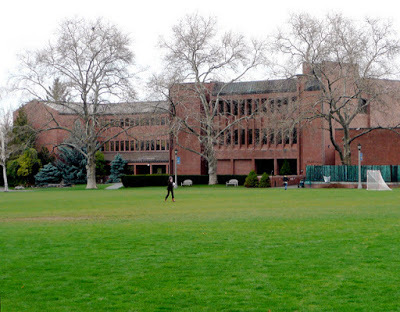 Olin Hall across Ankeny Field at Whitman College, where I spent many hours studying.At Whitman College, I was looking for something that felt as alive as the clubs I saw my favorite Portland bands perform in; something as vibrant as a triple Americano; something with stakes. To drink a cup of coffee is more than meeting a craving or attempting to caffeinate; it’s an optimistic gesture, as if to say: Whatever’s next, I’m going to find it. Soon enough, I found my people at Whitman and settled in for four years of hard, gratifying work. The Philosophy Department became my home, most notably because of a professor named Tom Davis, whose passion for the Socratic Method infused his lectures. Professor Davis was able to bridge the gap between ancient and modern concerns, applying Socrates’ style of inquiry to today’s problems: We discussed the ethical dilemmas of then-President Bill Clinton’s personal life; we pondered the inherent misunderstanding of youth suicides; we argued for or against the usefulness of gender roles in 20th Century America. Every conversation—always framed as a journey along a particular line of thinking—ultimately led to a moment of ecstatic uncertainty.
Olin Hall across Ankeny Field at Whitman College, where I spent many hours studying.At Whitman College, I was looking for something that felt as alive as the clubs I saw my favorite Portland bands perform in; something as vibrant as a triple Americano; something with stakes. To drink a cup of coffee is more than meeting a craving or attempting to caffeinate; it’s an optimistic gesture, as if to say: Whatever’s next, I’m going to find it. Soon enough, I found my people at Whitman and settled in for four years of hard, gratifying work. The Philosophy Department became my home, most notably because of a professor named Tom Davis, whose passion for the Socratic Method infused his lectures. Professor Davis was able to bridge the gap between ancient and modern concerns, applying Socrates’ style of inquiry to today’s problems: We discussed the ethical dilemmas of then-President Bill Clinton’s personal life; we pondered the inherent misunderstanding of youth suicides; we argued for or against the usefulness of gender roles in 20th Century America. Every conversation—always framed as a journey along a particular line of thinking—ultimately led to a moment of ecstatic uncertainty.
And there it is--ecstatic uncertainty--the only phrase I can come up with to describe the feeling I've carried with me through all stages of life; a feeling that, today, informs how I teach and write. Ecstatic uncertainty is what it feels like when a person is presented with the opportunity to stretch beyond his or her comfort level and current understanding of the world. While Socrates was largely misunderstood (and ultimately executed) for cornering noble people into logical fallacies, Professor Davis helped his students see the inherent liveliness of such exploration. Time and again he asked us to leap, and eventually, we learned that the net would appear.
Is it too much to think that picking blackberries as a child, that drinking coffee as a broody adolescent, that thinking deeply while gazing across Ankeny Field, that believing I could write about war, that living in an Airstream, that backpacking around an active volcano, that teaching creative adults, that writing flash fiction in particular, and that living the writing life are all alike in this way? That they're connected by ecstatic uncertainty and, at the end of the day, the belief that "Whatever's next, I'm going to find it" can, in fact, suggest a path through life?
Nope. Like a third shot of espresso--no, not too much at all.







Stories are valuable. This idea was instilled in me at an early age. Raised by two English majors, I grew up in a house of books. I was freely encouraged to explore all kinds of passions: puffy paint t-shirt designs, homemade bubble gum recipes, performing skits, building tree-forts, and picking blackberries were just a few of my early obsessions as a girl growing up in Portland, Oregon. Maturing during the peak of the Grunge music movement, my skeptical, brooding, teenage self emerged. By the time I reached Ms. Wood’s English class as a junior at Wilson High School, I believed there were too many things that “didn’t add up” about society. I felt angry, confused, adamant. What was our purpose in life and did it always have to come at a cost to others or the environment? I wanted answers and many of the places I’d grown accustomed to looking, didn’t have them.
Through Ms. Wood’s reverence for the practice of writing and her passionate teaching of Walden by Henry David Thoreau, in particular, I was changed. The answers I needed could be found through action. I dove deeper into the music and coffee cultures spilling across downtown Portland (R.I.P La Luna night club; R.I.P. Coffee People Coffee), including frequent pilgrimages to Powell’s City of Books. Coffee, books, music, and the outdoors felt authentic to me; ripe with potential for something that mattered, something that could make a difference. I also spent more time in the wilderness, including a 5-day solo backpacking trip in the White Mountains of New Hampshire, which I saved money for, planned, and completed at the age of 16.
 Olin Hall across Ankeny Field at Whitman College, where I spent many hours studying.At Whitman College, I was looking for something that felt as alive as the clubs I saw my favorite Portland bands perform in; something as vibrant as a triple Americano; something with stakes. To drink a cup of coffee is more than meeting a craving or attempting to caffeinate; it’s an optimistic gesture, as if to say: Whatever’s next, I’m going to find it. Soon enough, I found my people at Whitman and settled in for four years of hard, gratifying work. The Philosophy Department became my home, most notably because of a professor named Tom Davis, whose passion for the Socratic Method infused his lectures. Professor Davis was able to bridge the gap between ancient and modern concerns, applying Socrates’ style of inquiry to today’s problems: We discussed the ethical dilemmas of then-President Bill Clinton’s personal life; we pondered the inherent misunderstanding of youth suicides; we argued for or against the usefulness of gender roles in 20th Century America. Every conversation—always framed as a journey along a particular line of thinking—ultimately led to a moment of ecstatic uncertainty.
Olin Hall across Ankeny Field at Whitman College, where I spent many hours studying.At Whitman College, I was looking for something that felt as alive as the clubs I saw my favorite Portland bands perform in; something as vibrant as a triple Americano; something with stakes. To drink a cup of coffee is more than meeting a craving or attempting to caffeinate; it’s an optimistic gesture, as if to say: Whatever’s next, I’m going to find it. Soon enough, I found my people at Whitman and settled in for four years of hard, gratifying work. The Philosophy Department became my home, most notably because of a professor named Tom Davis, whose passion for the Socratic Method infused his lectures. Professor Davis was able to bridge the gap between ancient and modern concerns, applying Socrates’ style of inquiry to today’s problems: We discussed the ethical dilemmas of then-President Bill Clinton’s personal life; we pondered the inherent misunderstanding of youth suicides; we argued for or against the usefulness of gender roles in 20th Century America. Every conversation—always framed as a journey along a particular line of thinking—ultimately led to a moment of ecstatic uncertainty.And there it is--ecstatic uncertainty--the only phrase I can come up with to describe the feeling I've carried with me through all stages of life; a feeling that, today, informs how I teach and write. Ecstatic uncertainty is what it feels like when a person is presented with the opportunity to stretch beyond his or her comfort level and current understanding of the world. While Socrates was largely misunderstood (and ultimately executed) for cornering noble people into logical fallacies, Professor Davis helped his students see the inherent liveliness of such exploration. Time and again he asked us to leap, and eventually, we learned that the net would appear.
Is it too much to think that picking blackberries as a child, that drinking coffee as a broody adolescent, that thinking deeply while gazing across Ankeny Field, that believing I could write about war, that living in an Airstream, that backpacking around an active volcano, that teaching creative adults, that writing flash fiction in particular, and that living the writing life are all alike in this way? That they're connected by ecstatic uncertainty and, at the end of the day, the belief that "Whatever's next, I'm going to find it" can, in fact, suggest a path through life?
Nope. Like a third shot of espresso--no, not too much at all.








Published on February 26, 2016 05:00
February 23, 2016
What People Are Saying...
 {source}There's still time to register for my online flash fiction class via 49 Writers.
{source}There's still time to register for my online flash fiction class via 49 Writers."Katey, I took to heart your insightful comments and made the following changes. Hopefully this draft is closer. I welcome any further discussion and advice. I am grateful I took this leap." (--past participant)
The "welcome week" for this class runs from 2/29 to 3/6 which is simply for getting familiar with the online learning platform that we're using, as well as some introductions. Week One of course content is open from 3/7 - 3/13. This means you can register as late as 3/7 and still be good to go! The full syllabus is linked here. Although there's only 1 "formal critique" during the 4-week class, I will be commenting on drafts every day on the Discussion Boards, and this has proven to not only motivate people to write, but also to share and rapidly deepen the learning experience.
A few more student testimonials:
"Wow, Katey, this is terrific advice. I can't tell you how much I appreciate the very specific and detailed feedback. First drafts are a bear, aren't they, as you try to figure out what you want to say! Having readers like you makes all the difference for the next draft. Thanks again!"
"You hit the nail with your comment that there is some unifying force missing in my draft, as if there is a final bow that can be put on the story. I knew that, but had no idea what, exactly, was missing. I definitely want to revise this piece in consideration of your comments, especially when you said, 'It's not just about revenge...it's about your character's desire to feel strong again.' Yes, that is whats I was going for. I'm glad you saw that, but I agree, it can be made more clear. I might use your suggested metaphor, but change it to something in my own words. Thanks again!"
"Thanks for your comments! It is so great to write something and get such thoughtful and helpful feedback."
(All names and any identifying info has been altered or excluded, out of privacy for our online classroom and out of respect for my students.)








Published on February 23, 2016 05:00
February 19, 2016
Think Big: Heritage Story
In ongoing work with my creative consultant last week, I was asked to write about the possible connections between my early training in the Socratic method as an undergraduate at Whitman College, my 13 years of experience as a Shambhala Buddhist, and my life as a writer. In short, she advised, tell me the story of your creative heritage--not necessarily in terms of literary or artistic influences, rather, in terms of the evolution of thoughts and methodologies in my own development.
It took three hours, a good cup of coffee, and 8 pages of writing, but I feel I was able to draw some compelling connections between these important threads in my life.
Initially, I felt resistance to the exercise. I don't mind talking about my own work from time to time, and my husband Brad and my parents are kind supporters who listen when I have something I need to process out loud. But I didn't want to dissect the inner workings of my thought patterns within my own life--whether out of superstition, fatigue, uncertainty, or something I can't even name. Now that I've done it, I'm so pleased with the insights gained.
I can share the following few sentences, which made the entire process worthwhile:
 {source} I believe I have written a successful story or essay if it simultaneously depicts and provides an invitation to change. This is very different than saying my writing needs to cause change. It does not. It merely needs to embody the possibility; the prose and the circumstances—whether fictional or autobiographical—strive to evoke ecstatic uncertainty, paired with a sense of hope.
{source} I believe I have written a successful story or essay if it simultaneously depicts and provides an invitation to change. This is very different than saying my writing needs to cause change. It does not. It merely needs to embody the possibility; the prose and the circumstances—whether fictional or autobiographical—strive to evoke ecstatic uncertainty, paired with a sense of hope.
How have your thoughts evolved in your own writing and work as an artist or creative spirit? How does naming that evolution indicate where you might be headed next? I'm still pondering these things and I'd love to hear from others about their own insights as well. Meantime, time for more coffee--nectar of the gods.







It took three hours, a good cup of coffee, and 8 pages of writing, but I feel I was able to draw some compelling connections between these important threads in my life.
Initially, I felt resistance to the exercise. I don't mind talking about my own work from time to time, and my husband Brad and my parents are kind supporters who listen when I have something I need to process out loud. But I didn't want to dissect the inner workings of my thought patterns within my own life--whether out of superstition, fatigue, uncertainty, or something I can't even name. Now that I've done it, I'm so pleased with the insights gained.
I can share the following few sentences, which made the entire process worthwhile:
 {source} I believe I have written a successful story or essay if it simultaneously depicts and provides an invitation to change. This is very different than saying my writing needs to cause change. It does not. It merely needs to embody the possibility; the prose and the circumstances—whether fictional or autobiographical—strive to evoke ecstatic uncertainty, paired with a sense of hope.
{source} I believe I have written a successful story or essay if it simultaneously depicts and provides an invitation to change. This is very different than saying my writing needs to cause change. It does not. It merely needs to embody the possibility; the prose and the circumstances—whether fictional or autobiographical—strive to evoke ecstatic uncertainty, paired with a sense of hope.How have your thoughts evolved in your own writing and work as an artist or creative spirit? How does naming that evolution indicate where you might be headed next? I'm still pondering these things and I'd love to hear from others about their own insights as well. Meantime, time for more coffee--nectar of the gods.








Published on February 19, 2016 05:30
February 16, 2016
New #flashfiction Published
A while back, the wonderful folks at Fiction Southeast accepted two flash fictions that I wrote for publication. The first, "Seeing Marcella," was published this week and I'm happy to share this teaser here. Click this line from the story to read the flash in full: "She looks startled, as if she can't recall how the infant she's holding got into her arms."
At first glance, it may seem odd to have written a story from the perspective of a grown man living in Texas in the 1970's, looking back on his gang-infiltrated, rough past. But in the context of my journey in 2011, this story makes perfect sense to me now that I have gained perspective.
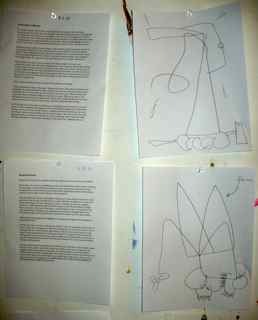 I was recovering from re-framing failure, and sought refuge in a studio in Houston, Texas where I lived with my friend, painter Howard Sherman, for four weeks. We called our collaboration THE WAREHOUSE SESSIONS. Each day we woke up to 100+ degree temperatures. Each day, he painted. And each day, for three weeks in a row, I wrote 1 flash fiction story that took place in a city, did not involve warfare, and did not portray anyone getting killed (in the real, present time of the story). Frequently, I took titles from New York Times articles as the prompt for my story, and as the title for my piece (without reading the content of the article itself). I called this challenge "minor urban catastrophes" and it was an experiment I curated for myself as a way to get a break from war lit for a while.
I was recovering from re-framing failure, and sought refuge in a studio in Houston, Texas where I lived with my friend, painter Howard Sherman, for four weeks. We called our collaboration THE WAREHOUSE SESSIONS. Each day we woke up to 100+ degree temperatures. Each day, he painted. And each day, for three weeks in a row, I wrote 1 flash fiction story that took place in a city, did not involve warfare, and did not portray anyone getting killed (in the real, present time of the story). Frequently, I took titles from New York Times articles as the prompt for my story, and as the title for my piece (without reading the content of the article itself). I called this challenge "minor urban catastrophes" and it was an experiment I curated for myself as a way to get a break from war lit for a while.
I stuck true to my plan, and at the end of 21 days, had 17 completed flash fictions all fitting loosely together. What bound them together was not Texas (for many of the stories take place elsewhere), rather, this sense of one "minor" thing going wrong (a "catastrophe") in an urban setting. In "Seeing Marcella," that "catastrophe" is when the narrator, Thomas, runs into Marcella, from the old neighborhood. Then and now, I believe that the truth is in the immediate details of our lives. I wanted to investigate that outside the bounds of war, and had a blast doing so.
In March, one more story from this series will be published at Fiction Southeast, and if you're eager for more in the meantime, check out this Why I Write essay that I wrote for them as well. Curious about my digs while I was in Texas? Suffice it to say I lived in an old warehouse, wrote in a loft, slept in a closet, cooked on a hot plate, and wrote my heart out.







At first glance, it may seem odd to have written a story from the perspective of a grown man living in Texas in the 1970's, looking back on his gang-infiltrated, rough past. But in the context of my journey in 2011, this story makes perfect sense to me now that I have gained perspective.
 I was recovering from re-framing failure, and sought refuge in a studio in Houston, Texas where I lived with my friend, painter Howard Sherman, for four weeks. We called our collaboration THE WAREHOUSE SESSIONS. Each day we woke up to 100+ degree temperatures. Each day, he painted. And each day, for three weeks in a row, I wrote 1 flash fiction story that took place in a city, did not involve warfare, and did not portray anyone getting killed (in the real, present time of the story). Frequently, I took titles from New York Times articles as the prompt for my story, and as the title for my piece (without reading the content of the article itself). I called this challenge "minor urban catastrophes" and it was an experiment I curated for myself as a way to get a break from war lit for a while.
I was recovering from re-framing failure, and sought refuge in a studio in Houston, Texas where I lived with my friend, painter Howard Sherman, for four weeks. We called our collaboration THE WAREHOUSE SESSIONS. Each day we woke up to 100+ degree temperatures. Each day, he painted. And each day, for three weeks in a row, I wrote 1 flash fiction story that took place in a city, did not involve warfare, and did not portray anyone getting killed (in the real, present time of the story). Frequently, I took titles from New York Times articles as the prompt for my story, and as the title for my piece (without reading the content of the article itself). I called this challenge "minor urban catastrophes" and it was an experiment I curated for myself as a way to get a break from war lit for a while.I stuck true to my plan, and at the end of 21 days, had 17 completed flash fictions all fitting loosely together. What bound them together was not Texas (for many of the stories take place elsewhere), rather, this sense of one "minor" thing going wrong (a "catastrophe") in an urban setting. In "Seeing Marcella," that "catastrophe" is when the narrator, Thomas, runs into Marcella, from the old neighborhood. Then and now, I believe that the truth is in the immediate details of our lives. I wanted to investigate that outside the bounds of war, and had a blast doing so.
In March, one more story from this series will be published at Fiction Southeast, and if you're eager for more in the meantime, check out this Why I Write essay that I wrote for them as well. Curious about my digs while I was in Texas? Suffice it to say I lived in an old warehouse, wrote in a loft, slept in a closet, cooked on a hot plate, and wrote my heart out.








Published on February 16, 2016 05:00
February 12, 2016
In Favor of Flashing (Fiction Y'all)
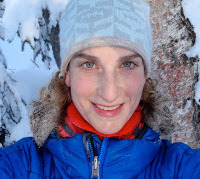 Last time I taught for 49 Writers I was in AnchorageIf you follow me on social media, you know I've been guest blogging left, right, and center this winter, making great strides in getting the word out about my two online classes. The first class is halfway through and rockin' and rollin'. The 12 participants are writing, reading, discussing, posting drafts (aka keeping me busy!), and putting real heart into their work. Another chance to explore flash fiction with me in an online forum kicks off in just a few weeks, this time through the fantastic 49 Alaska Writing Center. (And no, you don't have to be a member OR live in The Last Frontier in order to take this class). Here's a teaser of what I had to say over on their blog:
Last time I taught for 49 Writers I was in AnchorageIf you follow me on social media, you know I've been guest blogging left, right, and center this winter, making great strides in getting the word out about my two online classes. The first class is halfway through and rockin' and rollin'. The 12 participants are writing, reading, discussing, posting drafts (aka keeping me busy!), and putting real heart into their work. Another chance to explore flash fiction with me in an online forum kicks off in just a few weeks, this time through the fantastic 49 Alaska Writing Center. (And no, you don't have to be a member OR live in The Last Frontier in order to take this class). Here's a teaser of what I had to say over on their blog:"What do The Ramones, visual arts portraiture, and the elusive creative genius all have in common? Flash fiction, of course, though I should probably confess that, as a bona fide obsessive when it comes to the flash genre, it’s my personal opinion that all roads lead back to this jaw-dropping, fun, short-form style of writing.
The Ramones packed their songs with energy (proof), using concision, repetition, and rhythm much like any well-written flash piece. Portraiture captures a person at one particular moment in time; but the visual, tonal qualities of the artwork itself can suggesta life lived and events to come. The creative genius might be elusive, but one of the great equalizers is the theory of abundance. In other words, there’s always more where that came from, which is pretty much what reading any good flash fiction anthology feels like..."
(Read the full post HERE.)








Published on February 12, 2016 05:30
February 9, 2016
Think Big: Looking Back
Working with my creative consultant last week, I was asked to reflect on my childhood. We discussed formative moments; unique traits that might have gotten me teased, but are in fact strengths; and major disappointments and milestones surpassed. By digging deeply into those moments that shaped who I am today, we will be able to more thoroughly and precisely determine the exact kind of "right audience" for my services, as well as the most compelling lens through which to view my contributions in my field. Through freewriting and video consults, we were able to make some exciting connections. One such connection came out of a freewrite about my time as a young athlete:
When I think of childhood, I think of mud, rain, the slap of a soccer ball on cleats, and the kind of running and hollering that propels you forward into something bigger than yourself. In some ways, when I write, I am still doing that--running toward something, breathless and full body, because I believe with all my heart that writing can save the world. In the very least, it can lead to a moment of ecstatic connection. Like the way my teammates and I jumped into the air when someone on our team scored a goal. THAT MOMENT--when our cleats weren’t touching the ground, when we were all suspended together--that’s the kind of love and living I believe in.
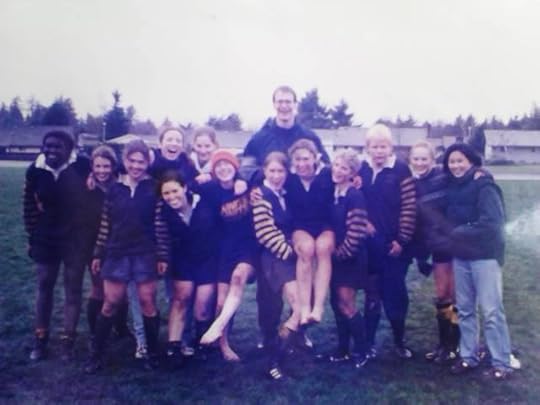
After soccer, I played rugby to the point of dislocating joints and cracking ribs (and I briefly stood on the field on crutches and coached teammates, while I healed). I never wanted to stop, but of course, none of us did. Growing up, I was the backpacker who was always at the end of the line, sometimes in tears, but I could not get enough of those mountains. I kept going. For thirty mountain ranges, including solo trips and backcountry rescues, I kept going. For most of my childhood and through my twenties, I was significantly overweight and physically awkward (I’m severely pigeon-toed, though this has receded with age). But I always remained physically active, as though I moved lithely or as though I was someone who did not walk strangely. On the rugby pitch, none of this mattered. The only thing that mattered was never giving up.
It was a blessing, really, that it never occurred to me that I “couldn’t do" what I loved just because I was slower or less physically gifted. Somehow, I found myself in good company that mostly helped me keep any naysayers at bay. I just did stuff; I followed my heart and interests. My supportive parents were undoubtedly a tremendous part of that, plus a few instrumental coaches I had along the way. And Nike, headquartered in my hometown of Portland, got something absolutely right when they made this commercial that still moves me to tears the same as it did the day it came out:








When I think of childhood, I think of mud, rain, the slap of a soccer ball on cleats, and the kind of running and hollering that propels you forward into something bigger than yourself. In some ways, when I write, I am still doing that--running toward something, breathless and full body, because I believe with all my heart that writing can save the world. In the very least, it can lead to a moment of ecstatic connection. Like the way my teammates and I jumped into the air when someone on our team scored a goal. THAT MOMENT--when our cleats weren’t touching the ground, when we were all suspended together--that’s the kind of love and living I believe in.

After soccer, I played rugby to the point of dislocating joints and cracking ribs (and I briefly stood on the field on crutches and coached teammates, while I healed). I never wanted to stop, but of course, none of us did. Growing up, I was the backpacker who was always at the end of the line, sometimes in tears, but I could not get enough of those mountains. I kept going. For thirty mountain ranges, including solo trips and backcountry rescues, I kept going. For most of my childhood and through my twenties, I was significantly overweight and physically awkward (I’m severely pigeon-toed, though this has receded with age). But I always remained physically active, as though I moved lithely or as though I was someone who did not walk strangely. On the rugby pitch, none of this mattered. The only thing that mattered was never giving up.
It was a blessing, really, that it never occurred to me that I “couldn’t do" what I loved just because I was slower or less physically gifted. Somehow, I found myself in good company that mostly helped me keep any naysayers at bay. I just did stuff; I followed my heart and interests. My supportive parents were undoubtedly a tremendous part of that, plus a few instrumental coaches I had along the way. And Nike, headquartered in my hometown of Portland, got something absolutely right when they made this commercial that still moves me to tears the same as it did the day it came out:








Published on February 09, 2016 05:00
February 5, 2016
The Online Luddite (teaser)
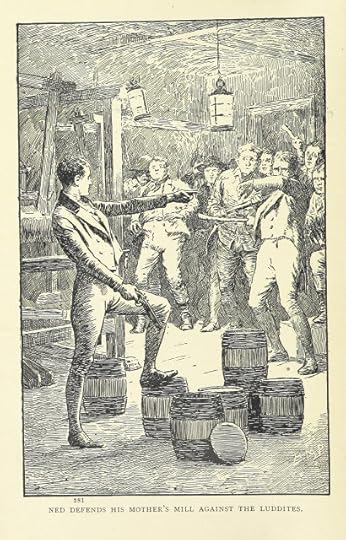 (source)For today's post, I'd like readers to head on over to David Abrams' The Quivering Pen blog, where I'm happy to be the guest blogger on tap. David has a great book about the Iraq war (FOBBIT), and he manages to be funny and realistic about a very hard subject. It's quite impressive. Meantime, his free blog subscription includes all kinds of writing from authors around the globe. Here's how my guest post begins, on being a luddite teaching an online class:
(source)For today's post, I'd like readers to head on over to David Abrams' The Quivering Pen blog, where I'm happy to be the guest blogger on tap. David has a great book about the Iraq war (FOBBIT), and he manages to be funny and realistic about a very hard subject. It's quite impressive. Meantime, his free blog subscription includes all kinds of writing from authors around the globe. Here's how my guest post begins, on being a luddite teaching an online class:"I’ve been giddy all month, but as someone who is labeled “a Luddite” by family and friends, I’m hesitant to talk about why. In a few weeks, my online flash fiction class for 49 Alaska Writing Center goes live. Working quietly from home, I’ve been creating the syllabus for this class, which will pop up for the month of March like a circus—dreamy, full of wonder, with a lot of good one-liners—then move on to make way for other classes.
My relationship with technology has been strained since I was a grunge-fuelled teenager. I grew up in the Pacific Northwest during the height of Pearl Jam and Nirvana. I saw Everclear perform for a cover charge of one can of beans (donated to the local homeless shelter). That was my kind of technology—person-to-person, pay it forward, experiential. By the time I moved out to go to college, I’d become one of those people with a “Kill Your TV” bumper sticker and have opted to live without television ever since. Smartphones? Suffice it to say, I made Verizon deactivate email capabilities on my phone and requested “the dumbest smartphone you can find” when signing my latest contract.
So what does being a Luddite have to do with flash fiction (and an online course, at that)?"
...Read the post in full, including craft tips about flash fiction writing, right here.








Published on February 05, 2016 05:00



